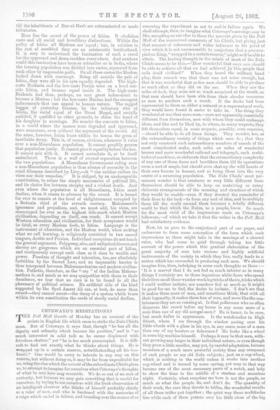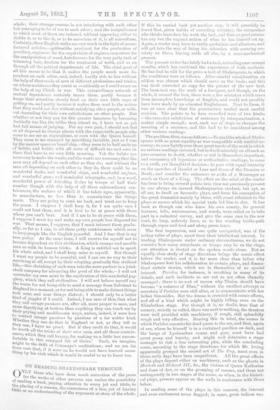CETEWAYO'S MEDITATIONS P
THE Pall Mall Gazelle of Monday has an account of the points in English life which seem to strike the Zulu Chiefs most. But of Cetewayo it says that, though "he has all the dignity and urbanity which become his position," and is " as much interested in solid talk as he seems displeased with frivolous chatter," yet "he is too much preoccupied. It is diffi- cult to find out exactly what he thinks about things. He is wrapped up in a certain reserve, notwithstanding all his bon- homie." One would be sorry to intrude in any way on this reserve, but without doing so, it may be far from unprofitable for us, using the clue which the 7? ceivete of the subordinate Chiefs gives us, to attempt to imagine for ourselves what Cetewayo's thoughts of what he sees here may resemble. We do so out of no sort of curiosity, but because we may gain something that is useful for ourselves, by trying to see ourselves with the fresh observation of an intelligent observer who thinks of himself probably chiefly as a ruler of men, and who is burdened with the memories of a reign which ended in failure, and brooding over the means of so
renewing the experiment as not to end in failure again. We shall attempt, then, to imagine what Cetewayo's musings may be like, accepting as our clue to them the account given by the Pall Mall of the unreserved comments of his Chiefs, but giving just that amount of coherence and wider infereace to his point of view which it is not unreasonable to conjecture that a preoccu- pied ex-King, "wrapped in a certain reserve," might well be able to attain. The leading thought in the minds of most of the Zulu Chiefs seems to be this,—' How wonderful that mere men should be able to achieve all that we find achieved .,by this people that calls itself civilised !' When they heard the military band ' play, their remark was that there was not noise enough, but that it was wonderful that so few men should be able to produce so much effect as they did on the ear. When they saw the miles of dock, they were not so much surprised at the result, as that men should have been able from their slender resources as mon to produce such a result. If the docks had, been represented to them as either a natural or a supernatural work, they would have found it easier to take in. The thing they wondered at was that mere men,—men not apparently essentially different from themselves, men with whom they could exchange ideas, and like and be liked by, to whom, in many respects, they felt themselves equal, in some respects, possibly, even superior, --should be able to do all these things. They wonder, too, at the extraordinary variety of things which men do ; that they not only construct such extraordinary numbers of vessels of the most complicated make, such miles on miles of wonderful houses and more wonderful railroad and telegraph, such multi- tudes of machines, so elaborate that the extraordinary complexity of any one of them dazes and bewilders them till its operations seem a sort of magic, but should even shut up the wild beasts of their own forests in houses, and so briug them into the very centre of a swarming population. The Zulu Chiefs' most per- manent wonder is that creatures so very little different from themselves should be able to keep on contriving so many elaborate arrangements of the meaning and structure of which they would be unable—even if they devoted the remainder of their lives to the task—to form any sort of idea, and to multiply these till the world around them becomes a totally different world to that which the Zulus, as a people, know. So much for the most vivid of the impressions made on Cetewayo's followers,—of which we take it that the writer in the Pall Mall had satisfactory evidence.
Now, let us pass to the conjectural part of our paper, and. endeavour to form some conception of the form which such impressions as these might take in the musings of a shrewd ruler, who had come to grief through taking too little account of the power which this gradual elaboration of the great majority of men into various and highly artificial instruments of the society in which they live, really lends to a nation which has succeeded in producing such men. We should imagine him, then, indulging in some such thoughts as these :- 'It is a marvel that I do not feel as much inferior as in many things I certainly am to those ingenious white-faces who spend their lives on all these wonder-working tricks of theirs, tricks which I could neither imitate, nor somehow feel as much as it might be good for me to feel, the desire to imitate, I don't see that it makes them more of men, and sometimes think, that with all their ingenuity, it makes them less of men, and more like the con- trivances they are so cunning at. Is that policeman who so often disperses the crowd before my house in any sense more of a man than one of my old assegai-men ? He is tamer, to be sure, but much duller in appearance. Is the watchmaker in High Street, whom I see through the window poring over his little wheels with a glass in his eye, in any sense more of a man than one of my hunters or fishermen ? He looks like a wheel in some big machine himself. Perhaps it may be that men, with- out growing any larger in their individual nature, or even though they grow a little smaller, may yet, by careful adaptation, become members of a much more powerful society than any composed of such people as my old Zulu subjects ; just as a cog-wheel, which ,is nothing in the world unless it works into another cog-wheel and is turned by some spring, yet may in that way become one of the most necessary parts of a watch, and help to show the time in the middle of a starless and moonless night. Certainly, what surprises me hero is not the people, so much as what the people do, and don't do. The quantity of their work, the care they devote to trifles, the wonderful results of all these trifles put together ; the quiet way these multitudes live while each of them potters over his little atom of the big whole ; their strange success in not interfering with each other but rnauagiug to be of use to each. other ; and the insignificance to which most of them arc reduced, without appearing either to dislike it, or to like it, or to be conscious of it is all marvellous. Certainly, these English strike me very much in the light of manu- factured articles,—goldsmiths produced for the production of jewellery, engineers for the supervision of engines, carpenters for the manipulation of wood, hairdressers for the very potty task of trimming hair, dentists for the treatment of teeth, and so on through all the pettiest departments of life. The chief good of all this seems to be that it makes the people much more de- pendent on each other, and, indeed, hardly able to live without the help of thousands of men of different professions and trades, on whose assistance they count as confidently as I could count on the help of my Chiefs in war. This extraordinary network of mutual dependence certainly tames them, partly because it keeps their attention closely fixed on their own little ways of getting on, and partly because it makes them used to the notion that they could not live without satisfying other people, or with- .out depending for their own satisfactions on other people. But whether or not they pay for this greater tameness by becoming decidedly too like the trifles they attend to, I have not as yet had full means of judging. For my own part, I should not feel at all disposed to change places with the respectable people who come to see me as deputations, or oven with the Queen herself. They seem to me cramped by something invisible, just as I was by the narrow space on board ship,—they seem to be half made up -of habits, and habits with all sorts of difficult ins and outs in them that have to me very little meaning. Yet the habits are necessary to make the wants, and the wants are necessary that the men may all depend on each other as they do ; and without the men all depending on each other as they do, there could be no wonderful docks, and. wonderful ships, and wonderful engines, -and wonderful guns, and wonderful telegraphs, and, in a word, wonderful .power of defeating Zulus by troops of half their number though with the help of all these extraordinary con- trivances, the makers of which it has taken ages, apparently, to manufacture, no less than to manufacture the things made. They are going to send me back, and trust me to keep the peace. I suppose I shall keep it, for I am quite sure I .could not beat them, and it is best to be at peace with those whom you can't beat. And if I am to be at peace with them, I suppose I must try and make my own people less disposed for war. That means, I suppose, that I must interest them gradu- ally, so far as I cam in all these petty contrivances which seem to keep people like the English peaceful. And I fear that is my true policy. At the same time, I will reserve for myself not to become dependent on this civilisation, which stamps and moulds men so with its human tricks. A King is entitled not to speak his whole mind, and I shall keep mine to myself. But though I want my people to be peaceful, and I can see no way to their .surviving at all, except by their adopting gradually this civilised life,—this shrinking of each man into the mere partner in a joint- stock company for advancing the good of the whole,—I will not surrender my own mind to the captivation of this Wonderful jug- glery, which they cull civilisation. I will not believe myself any the worse for not being able to send a message from Zululand to England in a moment, or for not being able to make distant things look near, and near things distant ; I should only be a better kind of juggler if I could. Indeed, I am sure of this, that what they call savage passions are, after all, more proper to man, and more dignifying at bottom than anything they can teach me by their prying and meddlesome ways, unless, indeed, it were how to control savage passions by passions of a far nobler kind. Whether they can do that in England or not, as they tell us they can, I have no proof. But if they could do that, it would be worth all the tricks of their wise men, and all those contriv- ances, which they call luxury, for making us a little less uncom- fortable in this cramped life of theirs: Such, we imagine, freight be the drift of Cetewayo's meditations ; and. we are far
rom sure that, if it were so, he would not have learned some- tiunabvhi 5 Viii, wIliola it would be useful to us to know too.































 Previous page
Previous page